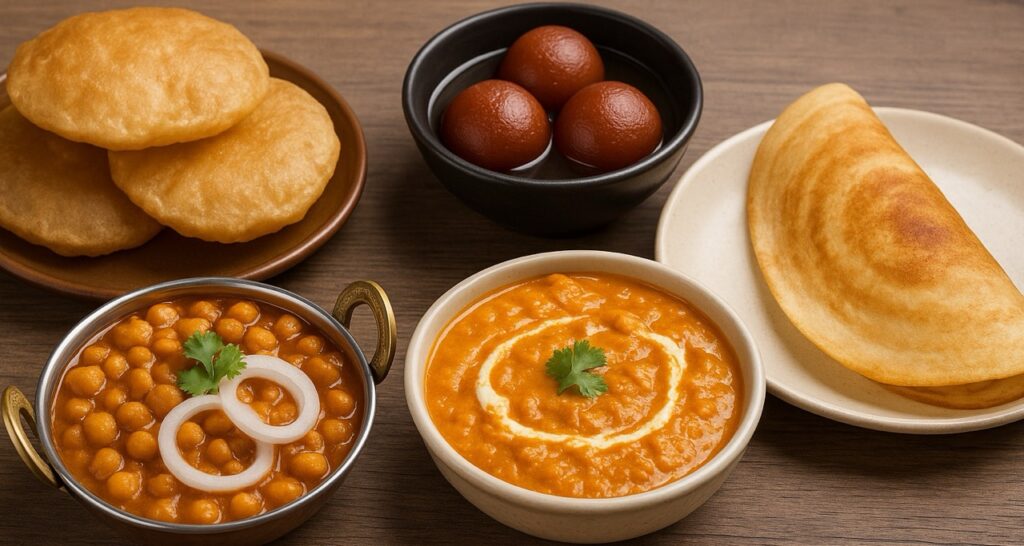
It was a typical Friday evening for Priya, a busy professional in Mumbai. After a long day at work, she decided to unwind with her favourite comfort meal – a hearty bowl of chana masala, accompanied by fluffy parathas, and a side of creamy yogurt.
The flavours were irresistible, evoking memories of family gatherings back home. However, as the night progressed, Priya found herself tossing and turning in bed.
Her stomach felt bloated and uncomfortable, and acid reflux kept her awake until the early hours of the morning. What was meant to be a nourishing end to her day had turned into a restless ordeal.
In many Indian households, evenings often feature heavy, spicy dinners with rich curries, fried snacks, or generous portions of rice laden with ghee. While these meals are culturally cherished and satisfying, they frequently lead to bloating, discomfort, or restless nights.
But the good news is that by making mindful choices and opting for lighter, easily digestible foods, you can not only enjoy your dinner without compromising on taste or tradition, but also wake up feeling refreshed and energized the next morning.
This blog is curated by Wellfinity’s dedicated functional wellness team, which is committed to guiding you toward lighter, gut-friendly evening meals.
Our goal is to help you savour flavourful dinners that support your body’s natural rhythms, enhance digestion, and foster restful sleep. So, let’s explore why your dinner selections are crucial and how simple adjustments can transform your nightly routine for better well-being.
Why Dinner Choices Matter for Digestion and Sleep
At night, your body’s digestive capacity naturally slows down as part of its circadian rhythm. This means the digestive system becomes less active, making it challenging to process heavy, spicy, or greasy foods efficiently.
Research indicates that late-night consumption of high-fat or spicy meals is associated with poorer sleep quality, increased acid reflux, and imbalances in gut microbiota.
The connection between heavy dinners, indigestion, poor sleep, and even autoimmune flare-ups, is not a straightforward case of cause-and-effect, but a complex interplay.
A large meal high in fats or complex carbohydrates strains the digestive system, which in turn leads to indigestion, bloating, and heartburn, eventually disrupting sleep.
Poor sleep weakens the immune system’s regulatory mechanisms and heightens inflammation, which is a key factor in autoimmune conditions. Moreover, indigestion from a heavy meal can inflame the digestive tract, thus contributing to systemic inflammation that may trigger flare-ups.
Additionally, disruptions to the gut microbiome (exacerbated by poor digestion) impact the gut-brain axis, thus affecting mood, sleep, and immune responses.
You may be surprised to know that this concept also finds a place in our ancient texts. According to Ayurveda, Agni (or digestive fire) is strongest around midday and naturally weakens in the evening, making heavy or spicy foods harder to digest at night.
Optimal agni ensures efficient digestion, nutrient absorption, and waste elimination. It also supports immune function, mental clarity, and vitality.
Thus, Ayurveda recommends our main meal should be during peak agni hours, and we should have a lighter meal in the evening to avoid indigestion, toxin buildup (ama), and disrupted sleep.
11 Indian Hard-to-Digest Foods to Avoid for Dinner
Here are 11 common culprits to steer clear of at dinner time, for better gut health.

Chana (Black Chickpeas)
Black chickpeas are nutritious, packed with protein, fiber, vitamins, and minerals. However, its complex structure and high fiber content make them take longer to break down. If consumed late, it can potentially cause gas, bloating, or indigestion. This can be especially challenging for individuals with IBS or leaky gut as high-fiber foods can trigger abdominal pain due to their increased gut sensitivity. For better digestion, the chana should be soaked overnight, cooked thoroughly and consumed earlier in the day, with or without spices.
Alternative: Moong Dal Khichdi — light, protein-rich, and easy to digest. Adding a little ghee and cumin makes it even gentler on the gut.
Rajma (Kidney Beans)
A staple in North Indian cuisine, rajma is high in complex carbohydrates, which make it difficult to digest even when properly soaked. Eating it at night can lead to a sense of heaviness and gas, which hinders restful sleep.
Alternative: Masoor Dal (Red Lentils) — cooks quickly, breaks down easily, and provides protein without the heaviness of rajma.
Pakoras and Deep-Fried Snacks
Pakoras, samosas, or bhature, are laden with oil, which can get inflammatory and also slows digestion significantly. They often trigger acidity – particularly when paired with sweets or tea – leading to discomfort.
Alternative: Steamed or Sauteed Veggie Cutlets — spiced with ginger and cumin, they satisfy cravings without excess oil.
Paneer (Cottage Cheese)
Heavy preparations like paneer curries are tough to digest in large portions at night. It can create mucus and sluggishness, especially for those with pitta or kapha dosha imbalances.
Alternative: Light Tofu Stir-Fry or Palak Soup — gives protein and nutrients without the heaviness or mucus-forming quality of paneer curries.
White Rice with Heavy Curries
White native rice in moderation is acceptable. But when combined with rich gravies such as butter masala or koftas, it becomes burdensome on the digestive system. This pairing causes blood sugar spikes followed by crashes, triggers acidity, adversely affecting sleep quality.
Alternative: Brown Rice or Millets with Light Dal — keeps fiber intact and is easier on the stomach when paired with simple lentils.
Curd/Yogurt
Curd is cooling and mucous-forming, which slows digestive activity. Ayurveda advises against it at night as it aggravates kapha. Instead, opt for warm jeera or ajwain water to aid digestion.
Alternative: Buttermilk (vegan options also preferred) with Roasted Jeera — soothing, digestion-friendly, and avoids nighttime kapha aggravation.
Garlic-Heavy Gravies
The strong pungency of garlic can irritate the gut lining in the evening, delaying digestive processes and causing bloating.
Alternative: Ginger or Hing flavored light dal — provides digestive warmth without the gut-irritating pungency of excess garlic.
Parathas and Puri
These are made with refined or processed wheat and often layered with ghee or seed oils, resulting in slow gut transit. They may disrupt your early morning bowel rhythm.
Alternative: Millet rotis or chillas — much lighter, especially when paired with lightly sautéed vegetables.
Leftover or Reheated Sabzis
Stale food, even from earlier in the day, loses its ‘prana’ (life force), making it harder to digest and increasing ‘ama’ (toxins) in the gut.
Alternative: Freshly Cooked Seasonal Vegetables (lightly sautéed or steamed) — packed with prana (life energy) and easy to digest.
Heavy Sweets or Mithai
The combination of sugar, ghee, and refined flour in sweets like gulab jamun or jalebi slows digestion, heightens inflammation, alters gut bacteria, feeds pathogens in the gut and disrupts melatonin production.
Alternative: Warm Kheer with Jaggery (made from oats, rice, or millets) — a naturally sweet option that’s lighter and less inflammatory or opt for a seasonal fruit or mejdool dates
Fast Food Dinners (Burgers, Fried Chicken, Pizzas)
Popular among younger generations and children, items like KFC buckets, cheesy burgers, fries, or pizzas are filled with unhealthy fats, refined carbohydrates, and artificial ingredients. They slow down digestion drastically at night, and provide minimal fiber for gut movement. This often results in bloating, gas, and morning constipation, which are common issues for school-going children and teens. In the long-term, this can impair gut microbiome health and elevate inflammation risks.
How to Choose Better Dinners for Gut Health
To foster gut health, focus on light, warm, and fresh meals that are easy to digest. Incorporate fermented foods like kefir or kimchi for probiotics, easily digestible proteins such as fish or lentils, and fiber-rich vegetables like carrots or zucchini. Opt for whole grains like quinoa when tolerated, and use anti-inflammatory ingredients including turmeric and ginger.
Stick to well-cooked moong dal, sautéed vegetables, or light khichdi. Enhance digestion with spices like jeera, ajwain, or saunf. Finish meals 2-3 hours before bedtime to optimize digestion and glycaemic balance, followed by a 10-20mins of moderate walking.
Avoid processed or fried foods, excess sugar, and artificial additives, and inflammatory combinations such as dairy with citrus, or proteins with starch-heavy foods.
Stay hydrated and consume food in moderate portions. Personalize your choices by observing your body’s responses and consult a professional if needed.
Eating appropriately at night promotes deeper sleep, reduced bloating, and a healthier gut. These small shifts can yield significant benefits, particularly for individuals managing autoimmune or inflammatory conditions.
After learning about mindful dinner choices through Wellfinity’s guidance, Priya swapped her heavy chana masala for a soothing moong dal khichdi with steamed vegetables. Now, her evenings end on a nourishing note, and she awakens energized, free from the discomfort that once plagued her nights.
So, if you want personalized dietary recommendations based on your gut health, you too should reach out to the Wellfinity team today.
FAQs: Night-Time Eating and Digestion
Q1: Can I have dal at night?
A: Yes, but choose lighter dals like moong or masoor. Avoid heavy dals like chana or rajma.
Q2: Is it okay to eat fruits at night?
A: Light fruits like papaya, pomegranate, guava, or stewed apple in small portions are fine. Avoid citrus and melons.
Q3: What’s a good time to finish dinner?
A: Ideally 2.5 to 3 hours before sleeping— latest by 7:30 or 8 PM for most people.
Q4: Can I drink milk before bed?
A: If you have any intolerance, inflammation, poor immune function, or chronic symptoms, milk can lead to further inflammation. Explore non-dairy sleep-friendly alternatives like almond milk.
Q5: Why does my stomach feel heavy even after a small dinner?
A: It may be due to food combinations, low digestive fire, poor digestive enzymes, hidden intolerances, or gut infections. Consider a functional gut health evaluation with Wellfinity.


